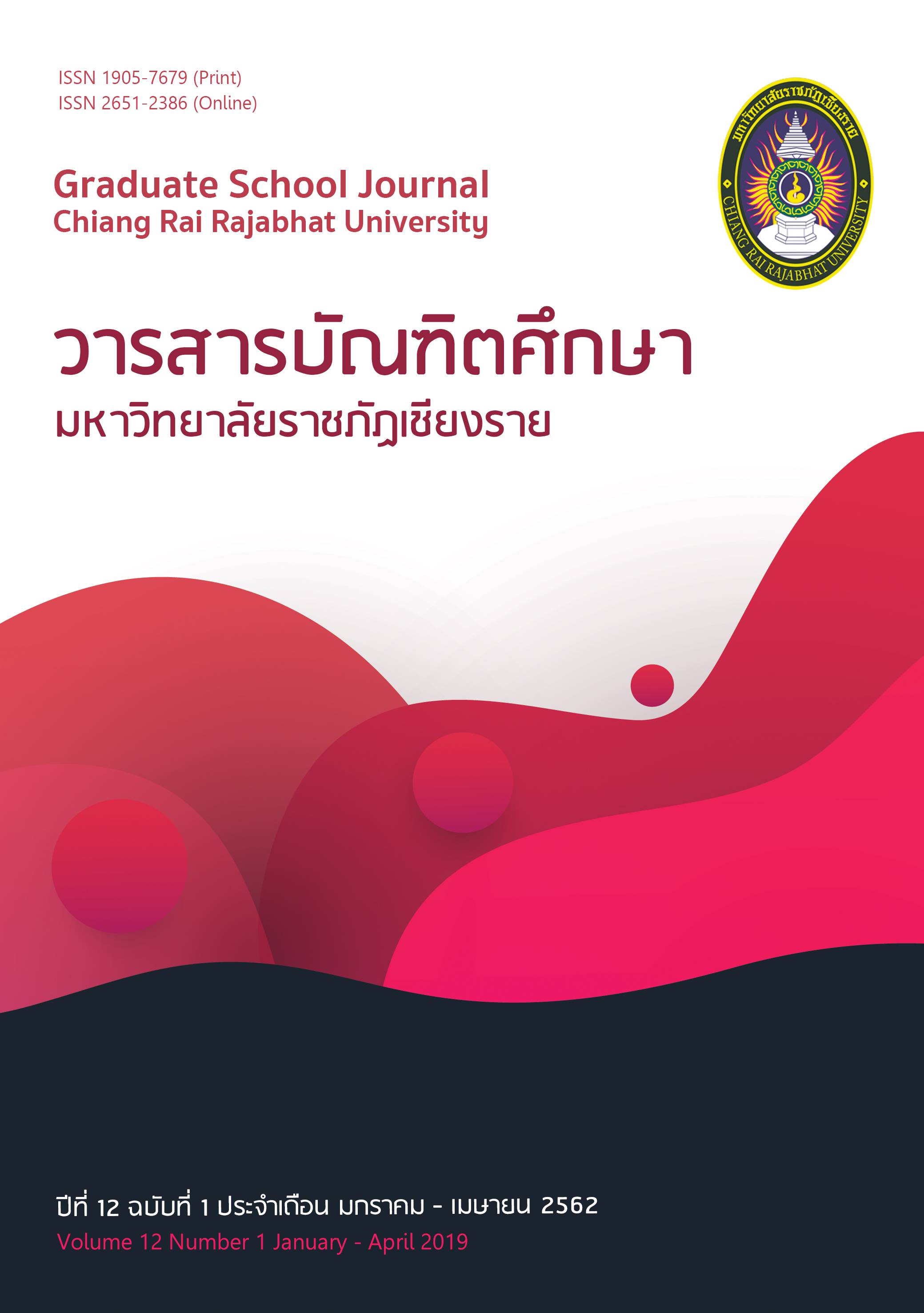Understanding the Inheritance Tax
Main Article Content
Abstract
Heritage, it is related to people in society if mention to heritage it does not mean just assets or money but including knowledge and learning inherited from the ancestors generation. Now we give more importance to the economy than society therefore heritage mean economic asset. Who have asset for heritage must do tax planning. Article author have studied law related to inheritance tax to understand the context of the government and taxpayers.
Heritage Tax Act effective date on February 1, 2016. The main objective was reduction of social disparity but after the announcement about 1 year ago the Revenue Department can not tax collection even though the government modified Gift Tax Act in section original. In section owner gave movable assets to everyone by duty or ceremony or traditional had tax exemption.
Difference of Heritage Tax Act and Gift Tax Act such as 1) tax collection : Heritage Tax Act when owner dead but Gift Tax when owner is still alive 2) tax payer : Heritage Tax Act both person and legal person Gift Tax Act only person and 3) tax rate, etc. Tax planning of the inheritance mostly received from consultant and ponder of assets owner. There are several approaches such as gradually transfer assets not over 20 million bath when still alive or establish company limited because the corporate tax calculate by fix rate and maybe other tax benefit. This makes the taxation not meet the objectives. If the taxpayer is aware of the purpose of the tax, know the duties and responsibilities for society, and compliance with applicable laws will be most beneficial.
Article Details
บทความที่ได้รับการตีพิมพ์เป็นลิขสิทธิ์ของวารสารมหาวิทยาลัยราชภัฎเชียงราย
ข้อความที่ปรากฏในบทความแต่ละเรื่องในวารสารวิชาการเล่มนี้เป็นความคิดเห็นส่วนตัวของผู้เขียนแต่ละท่านไม่เกี่ยวข้องกับมหาวิทยาลัยราชภัฎเชียงราย และคณาจารย์ท่านอื่นๆในมหาวิทยาลัยฯ แต่อย่างใด ความรับผิดชอบองค์ประกอบทั้งหมดของบทความแต่ละเรื่องเป็นของผู้เขียนแต่ละท่าน หากมีความผิดพลาดใดๆ ผู้เขียนแต่ละท่านจะรับผิดชอบบทความของตนเองแต่ผู้เดียว
References
โครงการสารานุกรมไทยสำหรับเยาวชน โดยพระราชประสงค์ในพระบาทสมเด็จพระเจ้าอยู่หัว. บทบัญญัติต่าง ๆ ในกฎหมายตราสามดวง. สืบค้นเมื่อ 18 พฤษภาคม 2561, จาก http://kanchanapisek.or.th/kp6/sub/book/book.php?book=30&chap=4&page=t30-4-infodetail05.html
ไตรรงค์ โตกระแส. (2558). แนวคิดเกี่ยวกับภาษีมรดกในประเทศไทย. สืบค้นเมื่อ 18 พฤษภาคม 2561, จาก http://library.senate.go.th/document/Ext9247/9247342_0002.PDF
ไทยรัฐ. (2560). 5 ทางรอดปลอดภาษีมรดก. สืบค้นเมื่อ 20 เมษายน 2561, จาก https://www.thairath.co.th/content/948582
พระราชบัญญัติแก้ไขเพิ่มเติมประมวลรัษฎากร (ฉบับที่ 40) พ.ศ. 2558. (2558, สิงหาคม 5). ราชกิจจานุเบกษา. เล่ม 132 ตอนที่ 72 ก. หน้า 12-15.
กรมสรรพากร. (2560). รายงานผลการจัดเก็บภาษีรายปี ปีงบประมาณ 2550 - 2559. สืบค้นเมื่อ 2 พฤษภาคม 2561, จาก http://www.rd.go.th/publish/310.0.html
โครงการสารานุกรมไทยสำหรับเยาวชน โดยพระราชประสงค์ในพระบาทสมเด็จพระเจ้าอยู่หัว. บทบัญญัติต่าง ๆ ในกฎหมายตราสามดวง. สืบค้นเมื่อ 18 พฤษภาคม 2561, จาก http://kanchanapisek.or.th/kp6/sub/book/book.php?book=30&chap=4&page=t30-4-infodetail05.html
ไตรรงค์ โตกระแส. (2558). แนวคิดเกี่ยวกับภาษีมรดกในประเทศไทย. สืบค้นเมื่อ 18 พฤษภาคม 2561, จาก http://library.senate.go.th/document/Ext9247/9247342_0002.PDF
ไทยรัฐ. (2560). 5 ทางรอดปลอดภาษีมรดก. สืบค้นเมื่อ 20 เมษายน 2561, จาก https://www.thairath.co.th/content/948582
พระราชบัญญัติแก้ไขเพิ่มเติมประมวลรัษฎากร (ฉบับที่ 40) พ.ศ. 2558. (2558, สิงหาคม 5). ราชกิจจานุเบกษา. เล่ม 132 ตอนที่ 72 ก. หน้า 12-15

